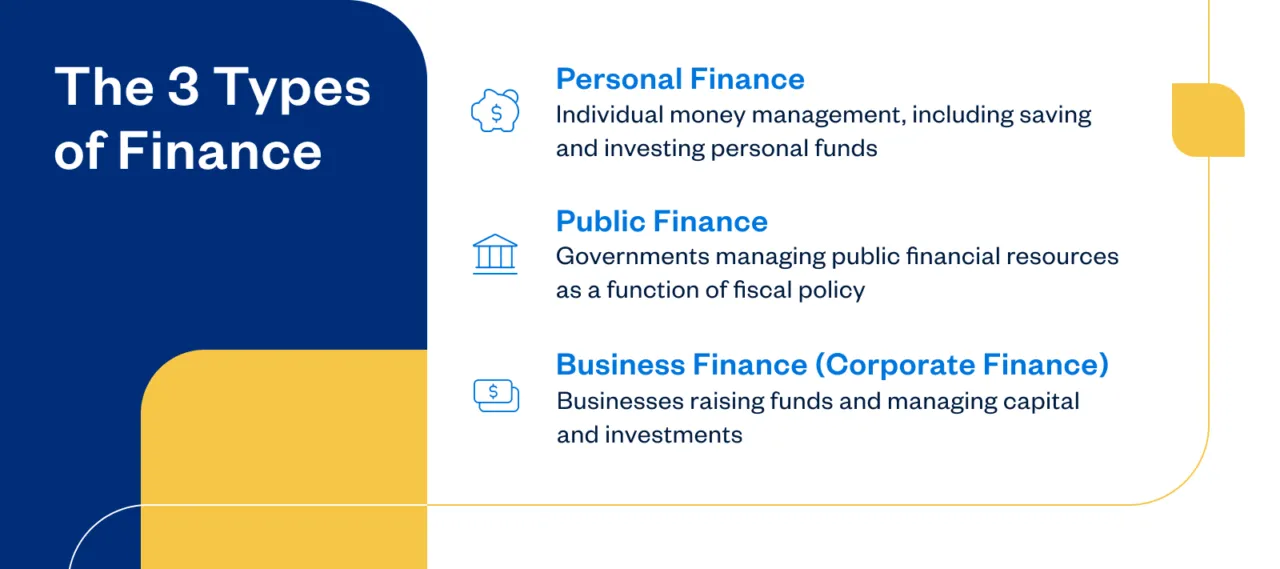What Is Finance? Definition and Types of Finance

You can’t run your business effectively without knowing how finance works and having a plan for how you’ll spend the money you earn. Understanding money management helps small businesses coordinate financing activities, avoid bankruptcy, limit risks, and get the best possible returns on different investments.
Finance is a broad subject, and it can get overwhelming along the way. To help you grasp the basics, we’ve covered essential information you need to know about how finance works for small businesses.
Here’s What We’ll Cover:
What Is the Difference Between Finance And Accounting?
Why Is Finance Important for a Small Business?
More Finance Resources for Businesses
What Is Finance?
Finance is simply how an individual or an organization manages its financial resources. It can include borrowing, investing, lending, budgeting, saving, spending, and forecasting.
While people tend to think of finance in terms of money, finance is about more than cash. While money is a legal tender used for many financial transactions, finance refers to asset allocation and management of monetary resources.
Finance cuts across multiple activities and departments, including developing a cash flow forecast for your business, keeping money in a high-interest savings account, and creating budgets and financial models.

The 3 Types of Finance
Finance is broadly categorized into 3 categories: personal finance, public finance, and corporate (or business) finance.

1. Personal Finance
Personal finance refers to managing an individual’s monetary resources across 5 key areas: Income, savings, investments, spending decisions, and asset protection. The goal is to make intelligent investment decisions and build a safety net and meet their goals without taking on too many debt obligations.
A personal financial system can also involve generational wealth transfer, taking advantage of tax planning opportunities, filing tax returns, using credit cards, and buying, selling, and managing assets. Personal finance is always tailored to one’s specific needs in the short, medium, or long term.
This means that two people may not make the same financial decisions because of their different goals, earning potential, incomes, and timeframes. When it comes to managing your finances, it’s important to set both short-term and long-term goals. For instance, you may want to prioritize paying off a loan in the short-term, while also considering long-term investments in real estate or the stock market. Personal finance software can be a helpful tool to assist you with modern financial management.
How Personal Finance Can Impact Your Business
Business owners must develop a strategic personal finance plan to protect them from unforeseen circumstances. For example, having personal savings may help you raise startup capital for your business, and saving for retirement helps the business owner avoid running out of money and being forced to sell the business.
2. Public Finance
Like individuals, governments must allocate their resources to different sectors of the economy. Public finance is how federal, state, and local institutions track revenue and manage expenses for all the services they provide to the public.
Some of a government’s most essential functions include collecting money from the public sector via taxes, raising capital through bonds, and channeling money into a broad range of services that benefit the public. When the public sector distributes tax revenues across multiple functions, including debt servicing, infrastructural development, and recurring expenditures. By overseeing income generation and government spending, government agencies help ensure a stable economy and prevent market failure.
Other aspects of public finance include tax management, debt issuance, budgeting, international trade, and inflation regulation. These factors have a direct and lasting effect on business and personal finance.
3. Business Finance (Corporate Finance)
Business finance, or corporate finance, covers all the financial activities related to running a business. You can think of this in terms of acquisitions and investments, funding, capital budgeting, risk management, and tax management needed for business growth in financial markets.
Companies must balance cash flow, risks, and investment opportunities to increase their value and strengthen their capital structure.
A great example of corporate finance is when a business chooses between equity financing and debt financing to raise capital. Equity financing is the act of securing funding through stock exchanges and issues, while debt finance is a loan that must be repaid with interest on an agreed date.
Businesses have to develop a revenue-generation plan which determines business profitability in the medium- and long term.
What Is the Difference Between Finance and Accounting?
Accounting and finance are both important to the success of any small business; however, they are not the same. The key difference between finance and accounting comes down to how they consider a company’s financial records.
Accounting focuses on cash inflow and outflow, reconciling a company’s financial statements and records, and delivering financial information to lenders, investors, and the general public.
Finance, on the other hand, uses accounting reports and documents to develop strategies that improve growth and profitability for businesses. Finance activities might include asset management, selecting the right financial instruments to invest in, financial modeling, and portfolio optimization.

Why Is Finance Important for a Small Business?
Small business owners don’t have to become financial managers or hire a chief financial officer to benefit from business finance. In fact, you may already be using financing information from your balance sheet, income statement, and cash flow statement to run a profitable business.
Here are several reasons finance is important to your small business:
- It drives strategic financial decision-making, such as buying insurance or deciding which financial products or financial institutions will allow you to earn interest.
- It helps you decide where to allocate resources and how to manage cash flow.
- It allows you to define long-term goals that will allow you to grow and scale.
- It helps you to understand the time value of money.
Key Takeaways: Finance
Finance is an all-encompassing term that covers resource and money management for individuals, public institutions, and businesses. There are 3 types of finance: personal finance, public finance, and business finance.
Running any business without understanding how money works puts many things on the line. Besides putting your company at risk of bankruptcy, poor money management results in unpredictability, which is bad for every business. The good thing is you don’t need a bachelor’s degree in finance to understand the basics highlighted in this article and apply them to your business.
More Finance Resources for Businesses
About the author
Janet Berry-Johnson, CPA, is a freelance writer with over a decade of experience working on both the tax and audit sides of an accounting firm. She’s passionate about helping people make sense of complicated tax and accounting topics. Her work has appeared in Business Insider, Forbes, and The New York Times, and on LendingTree, Credit Karma, and Discover, among others. You can learn more about her work at jberryjohnson.com.
RELATED ARTICLES


 What is Compound Interest & How To Calculate It?
What is Compound Interest & How To Calculate It? How to Set Up Payroll for Your Small Business in 6 Easy Steps
How to Set Up Payroll for Your Small Business in 6 Easy Steps How to Start a Bookkeeping Business – A Step-by-Step Guide
How to Start a Bookkeeping Business – A Step-by-Step Guide What is Blockchain Accounting? A Primer for Small Businesses
What is Blockchain Accounting? A Primer for Small Businesses Levered Free Cash Flow Formula (FCF Formula Guide)
Levered Free Cash Flow Formula (FCF Formula Guide) What is Certified Payroll?
What is Certified Payroll?